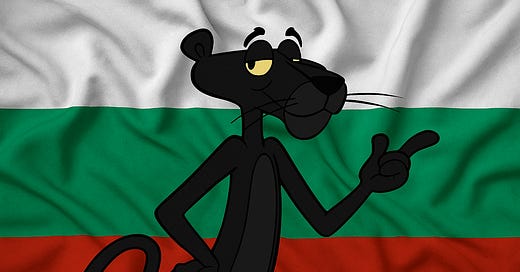Bulgaria: Leopard Antics at the End of the Line
We've lost the state but we hope to kill a wild black cat. You see, not only in the Middle East or in Ukraine do we witness terminal phenomena.
Today, I dare to humbly suggest a brief break from gazing into the bloody tumult of ongoing wars. Not, of course, because I am willing to diminish their significance in any way. I still believe they are matters of fundamental importance. But beyond the immediate nightmare of war and the international imperialist system, there are other things happening too — things that remind us that all this surrounding darkness can, at times, be grotesque and even laughable.
Here’s one such reminder.
In Bulgaria, we’re currently witnessing another episode full of dark comedy and sorrow which is yet another symptom of our statehood wasting away. It’s becoming harder and harder to find adequate language to describe these processes. It is certainly necessary to employ some kind of literary convention here.
Perhaps the most fitting approach would be to define them as a specific Balkan genre, something qualitatively close to the well-known theatre of the absurd, yet at the same time, its complete and utter quantitative antonym. Instead of subtle nuances that elicit laughter tinged with fear (or the other way around), we are presented with a linoleum backdrop of ugliness and embarrassment. There are no layered metaphors, because the vastness of normalized destruction of property, culture, and civilization simply cannot be contained in metaphor. What we’re left with is a post-nuclear landscape trying to pretend it’s anything but a toxic wasteland, where the only thing left to trip over is a pair of dirty underpants. Upon encountering such an obstacle, Bulgarians get momentarily outraged, then they laugh, and then they accept it. (Between the Pirin Mountains and the Danube, we’ve managed to compress the classic five-phase acceptance cycle of terminal dysfunction.)
And so, what we’re dealing with here isn’t theatre anymore — it’s a scandal of the absurd. A painfully sad spectacle, yet infuriatingly comical; blending existential despair and inferiority complexes with delusional fits of ridiculous madness. In short, a final seal on the decline of Bulgarian statehood after 35 years of its alleged democratization, marketization, and so-called Euro-Atlantic integration.
Racked by endless crisis, shoved into the eurozone with a bureaucratic knee to the ribs, Bulgaria suddenly came to a halt because somewhere, within this territory of fading function, a wild black cat is on the loose. Truly!
This scandal of absurdity, it turns out, had been gaining momentum since mid-June. Though, I’ll admit, I missed the beginning of it. I simply don’t have the time to track every Bulgarian gossip thread and the memes they spawn. But eventually there was so much of it that it inevitably caught my attention.
As it turns out, in the middle of this month, people began noticing a mysterious black leopard roaming the area around the vast Shumen Plateau Nature Reserve in the northeast of the country. At first, there was skepticism among residents of villages and small towns bordering the forest. Concerned citizens began submitting reports, including long-distance photos and videos they’d taken themselves, to both authorities and social media, raising alarms that an exotic predator was on the loose in a region heavily trafficked by tourists. For nearly two weeks now, local officials, forest rangers, hunters, and police have been combing through the park — an area spanning over 73 square kilometers.
A whole arsenal of technology has been deployed: camera traps (whatever that actually means), drones, thermal imaging. They even tried the so-called “blood trail” method, which is spilling blood from dead animals to lure the leopard into set traps. Naturally, none of it worked.
Incidentally, it’s still unclear what animal we’re even dealing with. Experts are debating based on the photos and video footage. Is it a leopard, a panther, or perhaps a black jaguar? Most seem to lean toward the leopard theory, which, all signs suggest, has been freely roaming the area for at least several weeks, leading quite an active and independent life.
What we do know for certain is that the problem of a wild cat on the loose in Bulgarian forests, posing a serious danger, is very real. The animal has also been captured on surveillance cameras in at least a dozen locations, both during calm walks and at full sprint. Most recently, it was spotted near the town of Isperich (not far from the Romanian border).
As helplessness mounted, the authorities issued a ban on visiting the reserve on June 20. Traps, both photographic and live-capture, have also been set in nearby residential areas.
Of course, no explanation exists, and none will be offered, for how this exotic fugitive ended up in Bulgaria in the first place. All that exists in the public sphere are media speculations and some rather uninspired conspiracy theories.
The most plausible and credible explanation seems to be the carelessness of someone running an illegal private menagerie. The cat must’ve simply escaped. In any case, it definitely entered Bulgaria illegally, since, according to existing law, importing such animals is forbidden, as clearly stated in points 54 through 56 of the Animal Welfare Act.
Zoologists speaking to the media claim that, based on analysis of the animal’s behavior captured on video, it’s reasonable to assume the creature has been living in the wild for at least several, perhaps even a dozen, weeks. According to them, it is highly dangerous to humans: extremely cunning, usually attacking from behind, incredibly agile and fast. In their view, the chances of capturing it alive are practically nil.
Naturally, the social media platforms were immediately flooded with both memes and conspiracy theories of toilet-tier quality. The leopard became the subject of obvious jokes and anxieties, but in truth, it’s simply a crude, symbolic stamp of total lawlessness and the collapse of the state. Despite mobilizing personnel from every imaginable institution that could even remotely be responsible for handling such a situation, absolutely nothing has been determined (let alone accomplished). Where is the leopard right now? How long has it been on the loose? How old is it? Who is supposed to catch it, and how? What protocols and safety procedures are in place for situations like this? Who bears responsibility? Which oversight body should be named as the one that failed in its duties?
Of course, these are questions that are rhetorical in their own peculiar way, because the answer to all of them is the same: no one knows. And let’s add: this isn’t even the first time something like this has happened in Bulgaria.
We’ve already become accustomed to such excesses. Their epicenters are usually the lavish estates of wealthy and bored Bulgarian mobsters. These individuals have long demonstrated a peculiar fondness for exotic animals—perhaps as a way to soothe their insecurities, perhaps imagining they inspire fear among their underlings or lower-rank criminals.
Take one of my favorite Bulgarian gangsters — Ivo Karamanski. And I say that without demagoguery, because he was simply a street thug who, in the 1990s, threw down the gauntlet to the most powerful bosses of Bulgaria’s organized crime world. Until the very end, he remained loyal to the ethos of the Balkan madman — dancing in nightclubs with a gold chain around his neck and a pistol raised high in his hand. He died (before hitting 40) a death that was almost lyrical: shot by an acquaintance jealous over a woman.
But his devotion to this particular brand of romanticism also manifested in the fact that he kept large apes and bears in the massive garden of his estate located right off the Sofia ring road, in the once-luxurious district of Simeonovo. And many other local barons proudly boasted of owning wild animals on their estates scattered across the country.
In this same context, one could also mention the brothers Plamen and Yordan Stoyanov, who at one time owned something resembling a private zoo. It housed, among other things, a tiger, a panther, a puma, and a crocodile. At the turn of the century, their company Ecometal Engineering was one of the biggest enterprises in Bulgaria specializing in car and heavy machinery recycling. Their “zoo” was discovered completely by accident in 2010, during a well-known Ministry of Interior operation codenamed “Octopus.” When officers entered the brothers’ estate, they were stunned. Behind the complex were a dozen or so exotic animals, including three Siberian tigers and two jaguars. The setup resembled a legitimate zoo, complete with cages, enclosures, and barriers, though of course, without any permits.
Surprisingly, the animals were quite well cared for, so animal rights activists didn’t have much to sink their teeth into. Eventually, the tigers and jaguars were relocated to zoos in Sofia, Stara Zagora, and Blagoevgrad. One of the tigers (named Martin) even ended up all the way in South Africa, where he was put up for auction.
Many years later, in July 2024, it became clear that the whole phenomenon had undergone a sort of plebeianization. Tastes in Bulgarian high society had apparently shifted, but instead, in a poor, peripheral Sofia neighborhood called Botunets, another extraordinary resident emerged. A crocodile.
The animal made itself at home in a makeshift pond formed simply from a crater that had opened up when part of the street collapsed. Locals even gave it an affectionate nickname: Kroko. It was gentle, posed no threat to anyone, lived peacefully, and quickly won the sympathy of the neighborhood. People would toss it raw chicken or scraps of meat from their kitchens. Eventually, however, Kroko was located by the police and taken to the Sofia Zoo. There, in the veterinary clinic, it was discovered that the animal was in terrible health. It was malnourished, and the “conditions of its upbringing” had severely stunted its development and growth.
Fortunately, it regained strength, was treated, and is now reportedly thriving at the Sofia Zoo.

Stories like this tend to spark widespread commentary, generate strong emotions, and stir the media pot for a few weeks and then, like everything else, simply become part of our absurd archive of contemporary history.
Institutions formally responsible for overseeing animal husbandry — especially when animals are kept in unregulated, illegal, and dangerous conditions — promptly return to their comfort zones, filled with plush inertia and a total absence of accountability. According to the neoliberal paradigm: nothing public has the right to function.
And the poor wild animal, which after all didn’t choose to end up in a wretched environment like modern Bulgaria, thousands of kilometers from the place it was born, will eventually be killed. Because that’s how this system works: first comes impunity for the perpetrator, then extermination for the victim. All, of course, for our collective safety. No doubt!







“ Because that’s how this system works: first comes impunity for the perpetrator, then extermination for the victim. All, of course, for our collective safety. No doubt!”
Spot on.